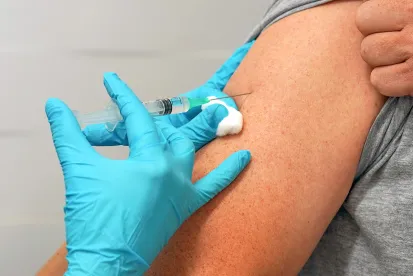On April 25, 2022, South Carolina Governor Henry McMaster signed into law House Bill 3126, which, among other things, bans state and local governments from imposing COVID-19 vaccine mandates as a condition of employment and provides certain protections for workers subject to private employers’ vaccination requirements.
Below are some points relevant to private employers (broadly defined in the law as “all employers other than state and political subdivisions”).
Unemployment Benefits
If a private employer terminates, suspends, or reduces an employee’s compensation because the employee fails to get a COVID-19 vaccination or booster, the employee is still eligible for unemployment benefits, subject to the usual statutory limits on amounts, duration, and other requirements.
Vaccine Incentives Permitted
Section 6 of the statute explicitly states that the law’s provisions do not prevent employers from encouraging, promoting, or administering vaccinations—or from offering incentives to employees who elect to be vaccinated. This section of the law refers to vaccinations in general terms, and thus this provision does not appear to be limited to COVID-19 vaccinations.
Prohibition on Extension of Vaccine Mandate to Independent Contractors/Third Parties
Under the law, if a private employer implements a vaccine mandate, it may not extend the mandate to independent contractors or other nonemployees who provide goods or services to the employer, nor may it coerce such individuals and third-party entities into implementing their own vaccine mandates in order to maintain the business relationship with the private employer. However, the law does carve out an exception to this rule. This section of the law does not apply to federal contractors, employers seeking to become federal contractors, or those subject to a federal regulation where the applicable contract or regulation includes a valid and enforceable contrary requirement and the employer submits an affidavit to the South Carolina Department of Employment and Workforce (SCDEW) attesting to that fact. This provision also does not appear to be limited to COVID-19 vaccination mandates.
Broader Exemptions
The law states that religious and medical exemptions “must be honored” with respect to any COVID-19 vaccine or booster requirement. Accordingly, any employer imposing a COVID-19 vaccine requirement on workers must extend broader exemptions than required by federal law:
-
Medical exemptions include the presence of antibodies, a prior positive COVID-19 test, or pregnancy. The law does not indicate exactly what an employee must present to his or her employer to secure this medical exemption (i.e., there is no specific requirement to submit a doctor’s note or physician statement, as is required in other states with similar exemptions from workplace vaccination requirements).
-
To claim a religious exemption, a person must provide the employer with a “short, plain statement” that receiving the COVID-19 vaccine and booster would violate a tenet of the person’s deeply held religious convictions.
-
As with the provision pertaining to third parties, this section of the law also contains a carveout from this requirement if the employer submits an affidavit to the SCDEW attesting to the fact that the employer is a federal contractor, is otherwise subject to a federal regulation that is contrary to the requirement, or will be required to enforce a contrary provision if awarded a federal contract the employer has sought to secure.
Prohibits Vaccine Status Discrimination in Public Accommodations
The law prohibits places of public accommodation—including hotels, restaurants, hospitals, retail stores, movie theaters, and other such establishments—from denying services based on an individual’s vaccination status. Private clubs and establishments not in fact open to the general public are not subject to this ban.
The law also provides similar limitations on public employers that wish to enact COVID-19 vaccination mandates, with certain exceptions.
The law is effective immediately and will remain in effect until December 31, 2023, unless its provisions are extended by the South Carolina General Assembly.
The law also extends the “South Carolina COVID-19 Liability Immunity Act” (Senate Bill 147), the state’s liability shield law, which previously expired on December 31, 2021. The liability protections against coronavirus-based claims for businesses covered under the “South Carolina COVID-19 Liability Immunity Act” now apply to all civil and administrative causes of action that arise between March 13, 2020, and December 31, 2023, and that are “based upon facts that occurred during this time period.”




 />i
/>i
